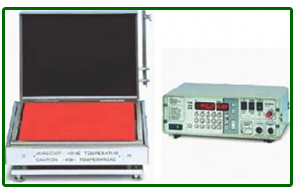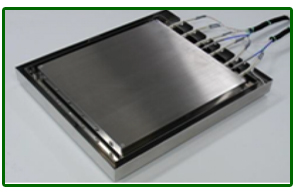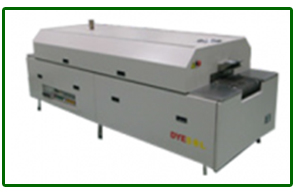Use:
Covered Programmable Hotplate is used in DSSC R&D to fire working and counter electrodes on Dye Sensitized Solar cells
Description:
The Covered Programmable Hotplate provides a consistent, controllable and reliable heat source for the firing of small working and counter electrodes for the production of test cells.
The Programmable Hotplate includes ramp timing and temperature controls. The key benefit to users of the Programmable Hotplate is that it can be programmed to precisely control the machine – an essential factor for achieving consistent, reliable results. Up to 32 temperature steps can be programmed and each temperature step can incorporate a ramp time or constant temperature time.
The Programmable Hotplate surface is high quality nickel plating; it is also highly robust and durable for use in any busy lab.
Specifications:
| Features | Description | Benefits |
| Temperature Range | Up to 600 0C | Allows a full range of temperature for firing DSC materials |
| Substrate Sizes | 230 mm x 160 mm | Accommodates from test cells up to tile size electrode |
| Temperature Uniformity | Due to the large thermal capacity of the Programmable Hotplate, the temperature uniformity, once stabilized is ±5% except within 10mm of the edge | Temperature uniformity ensures precise user control of the firing temperatures, essential for achieving consistent results |
| Programmable Timing | Up to 5 temperature steps- Temperature steps incorporate a ramp time and constant temperature time-Time range: both ramp and constant time up to 9 hours 59 minutes in 1 minute intervals | The programmable timing function with 5 temperature steps allows for multi-stage firing processes of different DSC material sets |
| Safety Features | Protective lid. Automatic off timing. | Protective lid protects user during operation. Programmable timing feature means the hotplate will turn off at a specific time. |
| Machine Requirement | 220 – 240 VAC, 50-60 Hz |
Use:
Programmable Hotplate is used in DSSC R&D to fire working and counter electrodes on Dye Sensitized Solar Cells.
Description:
Programmable Hotplate provides a consistent, controllable and reliable heat source for the firing of small working and counter electrodes for the production of test cells.
Programmable Hotplate includes ramp timing and temperature controls. The key benefit to users of the Programmable Hotplate is that it can be programmed to precisely control the machine – an essential factor for achieving consistent, reliable results. Up to 31 temperature steps can be programmed and each temperature step incorporates a ramp time and constant temperature time.
The Programmable Hotplate is made of high quality Copper alloy, heat-resistant alloy plating which decreases the possibility of contamination of substrates, it is also highly robust and durable for use in any lab.
Specifications:
| Features | Description | Benefits | |
| Temperature Range | Up to 650 0C | Allows a full range of temperature for firing DSC materials | |
| Substrate Sizes | 230 mm x 160 mm | Accommodates from test cells up to tile size electrode | |
| Temperature Uniformity | ± 2% | Temperature uniformity ensures precise user control of the firing temperatures, essential for achieving consistent results. | |
| Programmable Timing | -Up to 31 temperature steps-Temperature steps incorporate a ramp time and constant temperature time-Time range: both ramp and constant time up to 9 hours 59 minutes in 1 minute intervals | The programmable timing function with multiple temperature steps allows for multi-stage firing processes of different DSC material sets. | |
| Hot plate material | Copper alloy, heat-resistant alloy plating | ||
Use:
Belt Furnaces are used in Dye Sensitized Solar Cells to dry printed layers, activate and fire bus bars, working electrode, and counter electrode pastes.
Description:
Belt Furnaces have been sourced to allow for optimization of firing profiles suitable for sintering DSC materials.
Belt Furnaces are available as a lower temperature 4 zone drying furnace for printed DSSC materials, a shorter 4 zone furnace for firing catalyst materials for counter electrodes, and a 6 zone furnace for firing Titania dioxide for the working electrodes.
Temperature zones can be individually programmed to optimize firing profiles for DSSC materials in conjunction with controllable air flow throughout the furnace.
Specifications:
| Features | 4 Zone Drying FurnaceE014-1029 | 4 Zone CE FurnaceE014-1202 | 6 Zone WE FurnaceE014-1203 |
| Heating Mode | Infrared Quartz | FEC ceramic heating board | Infrared short wave heating tube |
| Max. Temperature | 200 0C | 650 0C | 700 0C |
| Long Term Operating Temperature | Room Temp. – 110 0C | 600 0C | 650 0C |
| Belt Width | 300 mm | 300 mm | 300 mm |
| Belt Materials | Stainless steel grade 304 | Nichrome (Cr20Ni80) | Stainless steel grade 316 |
| Max. Part Height | 30 mm | 30 mm | 30 mm |
| Heating Zone | 4 | 4 | 4 |
| Total Length | 2830 mm | 3960 mm | 4460 mm |
| Load Table | 600 mm | 350 mm | 600 mm |
| Heating Zone Length | 1200 mm | 1800 mm | 1800 mm |
| Cooling Zone Length | 300 mm | 910 mm | 870 mm |
| Unload Table | 600 mm | 350 mm | 600 mm |
| Working Voltage | AC 220V±10%, 50 Hz | AC 220V±10%, 50 Hz | AC 220V±10%, 50 Hz |
| Power Rating | >20 KVA | >30KVA | >40KVA |



